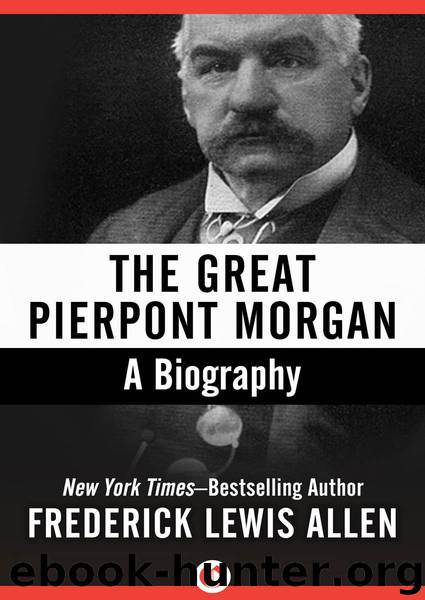The Great Pierpont Morgan by Allen Frederick Lewis;

Author:Allen, Frederick Lewis;
Language: eng
Format: epub
Publisher: Open Road Media
Published: 2016-04-05T04:00:00+00:00
2
But as business accumulated momentum during the McKinley days, an idea precedent to the idea of the national income, and immensely significant, did seize hold of the minds of business men with a vengeance: the idea of national—and even international—markets for individual businesses or combinations of businesses.
The concept was of course not new. Before the eighteen-nineties Rockefeller, for example, had spread the operations of his Standard Oil Trust so widely as to achieve something approaching a national monopoly, and of course many manufacturers—like the Singer Sewing Machine people, let us say—had sold their goods in so many areas of the country (to say nothing of other countries) as to conceive of the United States as a single market for their wares. And Pierpont Morgan, calling together the chief railroad presidents of the country, surely had had in mind at least a vague concept of all these separate lines making together something of a national pattern. But the vast majority even of good-sized businesses were local. Most pools and combinations in industry were apparently conceived more with the idea of holding up prices between competitors in a limited area than with the idea of controlling jointly a market stretching from coast to coast. The concept of national advertising was still in its infancy. Meanwhile during the depression of the mid-nineties almost all grand schemes for new business combinations had been held in abeyance or at least slowed down; the times were not propitious. Morgan, for example, had acquired his unique influence among the railroads of the East not by launching any magnificent plan for expansion, but by acting as receiver, as it were, for distressed corporations. But now, in 1897, ambition began to see its chance to make up for lost time.
The nation was now linked by railroads from Maine to California. The frontier was closed. The pioneer days were ending. The South was at last really recovering from the ravages of the Civil War. Manufacturers were learning the techniques of mass production. (Long before Henry Ford’s business began to boom, Andrew Carnegie had demonstrated the validity of the principle of huge production at low cost and small profit per unit.) And now, all at once, among shrewd and well-heeled business proprietors, the idea spread like a wild epidemic that there was a national market awaiting them if only they could expand or combine to exploit it. And the easy victory of the United States in the Spanish War in 1898 encouraged an extension of this idea: why not an international market, for that matter?
American industry was abruptly—and feverishly—coming of age.
Download
This site does not store any files on its server. We only index and link to content provided by other sites. Please contact the content providers to delete copyright contents if any and email us, we'll remove relevant links or contents immediately.
Waking Up in Heaven: A True Story of Brokenness, Heaven, and Life Again by McVea Crystal & Tresniowski Alex(37634)
Still Foolin’ ’Em by Billy Crystal(36236)
Cecilia; Or, Memoirs of an Heiress — Volume 1 by Fanny Burney(32396)
Cecilia; Or, Memoirs of an Heiress — Volume 3 by Fanny Burney(31785)
Cecilia; Or, Memoirs of an Heiress — Volume 2 by Fanny Burney(31756)
Fanny Burney by Claire Harman(26505)
Empire of the Sikhs by Patwant Singh(22929)
We're Going to Need More Wine by Gabrielle Union(18928)
Hans Sturm: A Soldier's Odyssey on the Eastern Front by Gordon Williamson(18448)
Plagued by Fire by Paul Hendrickson(17310)
Out of India by Michael Foss(16769)
All the Missing Girls by Megan Miranda(15451)
Cat's cradle by Kurt Vonnegut(15128)
Pimp by Iceberg Slim(14271)
Molly's Game by Molly Bloom(14041)
Bombshells: Glamour Girls of a Lifetime by Sullivan Steve(13942)
Leonardo da Vinci by Walter Isaacson(13131)
For the Love of Europe by Rick Steves(12473)
4 3 2 1: A Novel by Paul Auster(12245)
